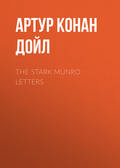
Артур Конан Дойл
Micah Clarke
Chapter XIII. Of Sir Gervas Jerome, Knight Banneret of the County of Surrey
The inn was very full of company, being occupied not only by many Government agents and couriers on their way to and from the seat of the rising, but also by all the local gossips, who gathered there to exchange news and consume Dame Hobson the landlady’s home-brewed. In spite, however, of this stress of custom and the consequent uproar, the hostess conducted us into her own private room, where we could consume her excellent cheer in peace and quietness. This favour was due, I think, to a little sly manoeuvring and a few whispered words from Saxon, who amongst other accomplishments which he had picked up during his chequered career had a pleasing knack of establishing friendly relations with the fair sex, irrespective of age, size, or character. Gentle and simple, Church and Dissent, Whig and Tory, if they did but wear a petticoat our comrade never failed, in spite of his fifty years, to make his way into their good graces by the help of his voluble tongue mid assured manner.
‘We are your grateful servants, mistress,’ said he, when the smoking joint and the batter pudding had been placed upon the table. ‘We have robbed you of your room. Will you not honour us so far as to sit down with us and share our repast?’
‘Nay, kind sir,’ said the portly dame, much flattered by the proposal; ‘it is not for me to sit with gentles like yourselves.’
‘Beauty has a claim which persons of quality, and above all cavalieros of the sword, are the first to acknowledge,’ cried Saxon, with his little twinkling eyes fixed in admiration upon her buxom countenance. ‘Nay, by my troth, you shall not leave us. I shall lock the door first. If you will not eat, you shall at least drink a cup of Alicant with me.’
‘Nay, sir, it is too much honour,’ cried Dame Hobson, with a simper. ‘I shall go down into the cellars and bring a flask of the best.’
‘Nay, by my manhood, you shall not,’ said Saxon, springing up from his seat. ‘What are all these infernal lazy drawers here for if you are to descend to menial offices?’ Handing the widow to a chair he clanked away into the tap-room, where we heard him swearing at the men-servants, and cursing them for a droning set of rascals who had taken advantage of the angelic goodness of their mistress and her incomparable sweetness of temper.
‘Here is the wine, fair mistress,’ said he, returning presently with a bottle in either hand. ‘Let me fill your glass. Ha! it flows clear and yellow like a prime vintage. These rogues can stir their limbs when they find that there is a man to command them.’
‘Would that there were ever such,’ said the widow meaningly, with a languishing look at our companion. ‘Here is to you, sir – and to ye, too, young sirs,’ she added, sipping at her wine. ‘May there be a speedy end to the insurrection, for I judge, from your gallant equipment, that ye be serving the King.’
‘His business takes us to the West,’ said Reuben, ‘and we have every reason to hope that there will be a speedy end to the insurrection.’
‘Aye, aye, though blood will be shed first,’ she said, shaking her head. ‘They tell me that the rebels are as many as seven thousand, and that they swear to give an’ take no quarter, the murderous villains! Alas! how any gentleman can fall to such bloody work when he might have a clean honourable occupation, such as innkeeping or the like, is more than my poor mind can understand. There is a sad difference betwixt the man who lieth on the cold ground, not knowing how long it may be before he is three feet deep in it, and he who passeth his nights upon a warm feather bed, with mayhap a cellar beneath it stocked with even such wines as we are now drinking.’ She again looked hard at Saxon as she spoke, while Reuben and I nudged each other beneath the table.
‘This business hath doubtless increased your trade, fair mistress,’ quoth Saxon.
‘Aye, and in the way that payeth best,’ said she. ‘The few kilderkins of beer which are drunk by the common folk make little difference one way or the other. But now, when we have lieutenants of counties, officers, mayors, and gentry spurring it for very life down the highways, I have sold more of my rare old wines in three days than ever I did before in a calendar month. It is not ale, or strong waters, I promise you, that those gentles drink, but Priniac, Languedoc, Tent, Muscadine, Chiante, and Tokay – never a flask under the half-guinea.’
‘So indeed!’ quoth Saxon thoughtfully. ‘A snug home and a steady income.’
‘Would that my poor Peter had lived to share it with me,’ said Dame Hobson, laying down her glass, and rubbing her eyes with a corner of her kerchief. ‘He was a good man, poor soul, though in very truth and between friends he did at last become as broad and as thick as one of his own puncheons. All well, the heart is the thing! Marry come up! if a woman were ever to wait until her own fancy came her way, there would be more maids than mothers in the land.’
‘Prythee, good dame, how runs your own fancy?’ asked Reuben mischievously.
‘Not in the direction of fat, young man,’ she answered smartly, with a merry glance at our plump companion.
‘She has hit you there, Reuben,’ said I.
‘I would have no pert young springald,’ she continued, ‘but one who hath knowledge of the world, and ripe experience. Tall he should be, and of sinewy build, free of speech that he might lighten the weary hours, and help entertain the gentles when they crack a flagon of wine. Of business habits he must be, too, forsooth, for is there not a busy hostel and two hundred good pounds a year to pass through his fingers? If Jane Hobson is to be led to the altar again it must be by such a man as this.’
Saxon had listened with much attention to the widow’s words, and had just opened his mouth to make some reply to her when a clattering and bustle outside announced the arrival of some traveller. Our hostess drank off her wine and pricked up her ears, but when a loud authoritative voice was heard in the passage, demanding a private room and a draught of sack, her call to duty overcame her private concerns, and she bustled off with a few words of apology to take the measure of the new-comer.
‘Body o’ me, lads!’ quoth Decimus Saxon the moment that she disappeared, ‘ye can see how the land lies. I have half a mind to let Monmouth carve his own road, and to pitch my tent in this quiet English township.’
‘Your tent, indeed!’ cried Reuben; ‘it is a brave tent that is furnished with cellars of such wine as we are drinking. And as to the quiet, my illustrious, if you take up your residence here I’ll warrant that the quiet soon comes to an end.’
‘You have seen the woman,’ said Saxon, with his brow all in a wrinkle with thought. ‘She hath much to commend her. A man must look to himself. Two hundred pounds a year are not to be picked off the roadside every June morning. It is not princely, but it is something for an old soldier of fortune who hath been in the wars for five-and-thirty years, and foresees the time when his limbs will grow stiff in his harness. What sayeth our learned Fleming – “an mulier – ” but what in the name of the devil have we here?’
Our companion’s ejaculation was called forth by a noise as of a slight scuffle outside the door, with a smothered ‘Oh, sir!’ and ‘What will the maids think?’ The contest was terminated by the door being opened, and Dame Hobson re-entering the room with her face in a glow, and a slim young man dressed in the height of fashion at her heels.
‘I am sure, good gentlemen,’ said she, ‘that ye will not object to this young nobleman drinking his wine in the same room with ye, since all the others are filled with the townsfolk and commonalty.’
‘Faith! I must needs be mine own usher,’ said the stranger, sticking his gold-laced cap under his left arm and laying his hand upon his heart, while he bowed until his forehead nearly struck the edge of the table. ‘Your very humble servant, gentlemen, Sir Gervas Jerome, knight banneret of his Majesty’s county of Surrey, and at one time custos rotulorum of the district of Beacham Ford.’
‘Welcome, sir,’ quoth Reuben, with a merry twinkle in his eye. ‘You have before you Don Decimo Saxon of the Spanish nobility, together with Sir Micah Clarke and Sir Reuben Lockarby, both of his Majesty’s county of Hampshire.’
‘Proud and glad to meet ye, gentlemen!’ cried the newcomer, with a flourish. ‘But what is this upon the table? Alicant? Fie, fie, it is a drink for boys. Let us have some good sack with plenty of body in it. Claret for youth, say I, sack for maturity, and strong waters in old age. Fly, my sweetest, move those dainty feet of thine, for egad! my throat is like leather. Od’s ‘oons, I drank deep last night, and yet it is clear that I could not have drunk enough, for I was as dry as a concordance when I awoke.’
Saxon sat silently at the table, looking so viciously at the stranger out of his half-closed glittering eyes that I feared that we should have another such brawl as occurred at Salisbury, with perhaps a more unpleasant ending. Finally, however, his ill-humour at the gallant’s free and easy attention to our hostess spent itself in a few muttered oaths, and he lit his long pipe, the never-failing remedy of a ruffled spirit. As to Reuben and myself, we watched our new companion half in wonder and half in amusement, for his appearance and manners were novel enough to raise the interest of inexperienced youngsters like ourselves.
I have said that he was dressed in the height of fashion, and such indeed was the impression which a glance would give. His face was thin and aristocratic, with a well-marked nose, delicate features, and gay careless expression. Some little paleness of the cheeks and darkness under the eyes, the result of hard travel or dissipation, did but add a chastening grace to his appearance. His white periwig, velvet and silver riding coat, lavender vest and red satin knee-breeches were all of the best style and cut, but when looked at closely, each and all of these articles of attire bore evidence of having seen better days. Beside the dust and stains of travel, there was a shininess or a fading of colour here and there which scarce accorded with the costliness of their material or the bearing of their wearer. His long riding-boots had a gaping seam in the side of one of them, whilst his toe was pushing its way through the end of the other. For the rest, he wore a handsome silver-hilted rapier at his side, and had a frilled cambric shirt somewhat the worse for wear and open at the front, as was the mode with the gallants of those days. All the time he was speaking he mumbled a toothpick, which together with his constant habit of pronouncing his o’s as a’s made his conversation sound strange to our ears. (Note D Appendix) Whilst we were noting these peculiarities he was reclining upon Dame Hobson’s best taffatta-covered settee, tranquilly combing his wig with a delicate ivory comb which he had taken from a small satin bag which hung upon the right of his sword-belt.
‘Lard preserve us from country inns!’ he remarked. ‘What with the boors that swarm in every chamber, and the want of mirrors, and jasmine water, and other necessaries, blister me if one has not to do one’s toilet in the common room. ‘Oons! I’d as soon travel in the land of the Great Mogul!’
‘When you shall come to be my age, young sir,’ Saxon answered, ‘you may know better than to decry a comfortable country hostel.’
‘Very like, sir, very like!’ the gallant answered, with a careless laugh. ‘For all that, being mine own age, I feel the wilds of Wiltshire and the inns of Bruton to be a sorry change after the Mall, and the fare of Pontack’s or the Coca Tree. Ah, Lud! here comes the sack! Open it, my pretty Hebe, and send a drawer with fresh glasses, for these gentlemen must do me the honour of drinking with me. A pinch of snuff, sirs? Aye, ye may well look hard at the box. A pretty little thing, sirs, from a certain lady of title, who shall be nameless; though, if I were to say that her title begins with a D and her name with a C, a gentleman of the Court might hazard a guess.’
Our hostess, having brought fresh glasses, withdrew, and Decimus Saxon soon found an opportunity for following her. Sir Gervas Jerome continued, however, to chatter freely to Reuben and myself over the wine, rattling along as gaily and airily as though we were old acquaintances.
‘Sink me, if I have not frighted your comrade away!’ he remarked, ‘Or is it possible that he hath gone on the slot of the plump widow? Methought he looked in no very good temper when I kissed her at the door. Yet it is a civility which I seldom refuse to anything which wears a cap. Your friend’s appearance smacked more of Mars than of Venus, though, indeed, those who worship the god are wont to be on good terms with the goddess. A hardy old soldier, I should judge, from his feature and attire.’
‘One who hath seen much service abroad,’ I answered.
‘Ha! ye are lucky to ride to the wars in the company of so accomplished a cavalier. For I presume that it is to the wars that ye are riding, since ye are all so armed and accoutred.’
‘We are indeed bound for the West,’ I replied, with some reserve, for in Saxon’s absence I did not care to be too loose-tongued.
‘And in what capacity?’ he persisted. ‘Will ye risk your crowns in defence of King James’s one, or will ye strike in, hit or miss, with these rogues of Devon and Somerset? Stop my vital breath, if I would not as soon side with the clown as with the crown, with all due respect to your own principles!’
‘You are a daring man,’ said I, ‘if you air your opinions thus in every inn parlour. Dost not know that a word of what you have said, whispered to the nearest justice of the peace, might mean your liberty, if not your life?’
‘I don’t care the rind of a rotten orange for life or liberty either,’ cried our acquaintance, snapping his finger and thumb. ‘Burn me if it wouldn’t be a new sensation to bandy words with some heavy-chopped country justice, with the Popish plot still stuck in his gizzard, and be thereafter consigned to a dungeon, like the hero in John Dryden’s latest. I have been round-housed many a time by the watch in the old Hawkubite days; but this would be a more dramatic matter, with high treason, block, and axe all looming in the background.’
‘And rack and pincers for a prologue,’ said Reuben. ‘This ambition is the strangest that I have ever heard tell of.’
‘Anything for a change,’ cried Sir Gervas, filling up a bumper. ‘Here’s to the maid that’s next our heart, and here’s to the heart that loves the maids! War, wine, and women, ‘twould be a dull world without them. But you have not answered my question.’
‘Why truly, sir,’ said I, ‘frank as you have been with us, I can scarce be equally so with you, without the permission of the gentleman who has just left the room. He is the leader of our party. Pleasant as our short intercourse has been, these are parlous times, and hasty confidences are apt to lead to repentance.’
‘A Daniel come to judgment!’ cried our new acquaintance. ‘What ancient, ancient words from so young a head! You are, I’ll warrant, five years younger than a scatterbrain like myself, and yet you talk like the seven wise men of Greece. Wilt take me as a valet?’
‘A valet!’ I exclaimed.
‘Aye, a valet, a man-servant. I have been waited upon so long that it is my turn to wait now, and I would not wish a more likely master. By the Lard! I must, in applying for a place, give an account of my character and a list of my accomplishments. So my rascals ever did with me, though in good truth I seldom listened to their recital. Honesty – there I score a trick. Sober – Ananias himself could scarce say that I am that. Trustworthy – indifferently so. Steady – hum! about as much so as Garraway’s weathercock. Hang it, man, I am choke full of good resolutions, but a sparkling glass or a roguish eye will deflect me, as the mariners say of the compass. So much for my weaknesses. Now let me see what qualifications I can produce. A steady nerve, save only when I have my morning qualms, and a cheerful heart; I score two on that. I can dance saraband, minuet, or corranto; fence, ride, and sing French chansons. Good Lard! who ever heard a valet urge such accomplishments? I can play the best game of piquet in London. So said Sir George Etherege when I won a cool thousand off him at the Groom Parter. But that won’t advance me much, either. What is there, then, to commend me? Why, marry, I can brew a bowl of punch, and I can broil a devilled fowl. It is not much, but I can do it well.’
‘Truly, good sir,’ I said, with a smile, ‘neither of these accomplishments is like to prove of much use to us on our present errand. You do, however, but jest, no doubt, when you talk of descending to such a position.’
‘Not a whit! not a whit!’ he replied earnestly. ‘“To such base uses do we come,” as Will Shakespeare has it. If you would be able to say that you have in your service Sir Gervas Jerome, knight banneret, and sole owner of Beacham Ford Park, with a rent-roll of four thousand good pounds a year, he is now up for sale, and will be knocked down to the bidder who pleases him best. Say but the word, and we’ll have another flagon of sack to clinch the bargain.’
‘But,’ said I, ‘if you are indeed owner of this fair property, why should you descend to so menial an occupation?’
‘The Jews, the Jews, oh most astute and yet most slow-witted master! The ten tribes have been upon me, and I have been harried and wasted, bound, ravished, and despoiled. Never was Agag, king of Amalek, more completely in the hands of the chosen, and the sole difference is that they have hewed into pieces mine estate instead of myself.’
‘Have you lost all, then?’ Reuben asked, open-eyed.
‘Why no – not all – by no means all!’ he answered, with a merry laugh; ‘I have a gold Jacobus and a guinea or two in my purse. ‘Twill serve for a flask or so yet. There is my silver-hilted rapier, my rings, my gold snuff-box, and my watch by Tompion at the sign of the Three Crowns. It was never bought under a hundred, I’ll warrant. Then there are such relics of grandeur as you see upon my person, though they begin to look as frail and worn as a waiting-woman’s virtue. In this bag, too, I retain the means for preserving that niceness and elegance of person which made me, though I say it, as well groomed a man as ever set foot in St. James’s Park. Here are French scissors, eyebrow brush, toothpick case, patch-box, powder-bag, comb, puff, and my pair of red-heeled shoes. What could a man wish for more? These, with a dry throat, a cheerful heart, and a ready hand, are my whole stock in trade.’
Reuben and I could not forbear from laughing at the curious inventory of articles which Sir Gervas had saved from the wreck of his fortunes. He upon seeing our mirth was so tickled at his own misfortunes, that he laughed in a high treble key until the whole house resounded with his merriment. ‘By the Mass,’ he cried at last, ‘I have never had so much honest amusement out of my prosperity as hath been caused in me by my downfall. Fill up your glasses!’
‘We have still some distance to travel this evening, and must not drink more,’ I observed, for prudence told me that it was dangerous work for two sober country lads to keep pace with an experienced toper.
‘So!’ said he in surprise. ‘I should have thought that would be a “raison de plus,” as the French say. But I wish your long-legged friend would come back, even if he were intent upon slitting my weazand for my attention to the widow. He is not a man to flinch from his liquor, I’ll warrant. Curse this Wiltshire dust that clings to my periwig!’
‘Until my comrade returns, Sir Gervas,’ said I, ‘you might, since the subject does not appear to be a painful one to you, let us know how these evil times, which you bear with such philosophy, came upon you.’
‘The old story!’ he answered, flicking away a few grains of snuff with his deeply-laced cambric handkerchief. ‘The old, old story! My father, a good, easy country baronet, finding the family purse somewhat full, must needs carry me up to town to make a man of me. There as a young lad I was presented at Court, and being a slim active youngster with a pert tongue and assured manner, I caught the notice of the Queen, who made me one of her pages of honour. This post I held until I grew out of it, when I withdrew from town, but egad! I found I must get back to it again, for Beacham Ford Park was as dull as a monastery after the life which I had been living. In town I stayed then with such boon companions as Tommy Lawson, my Lord Halifax, Sir Jasper Lemarck, little Geordie Chichester, aye, and old Sidney Godolphin of the Treasury; for with all his staid ways and long-winded budgets he could drain a cup with the best of us, and was as keen on a main of cocks as on a committee of ways and means. Well, it was rare sport while it lasted, and sink me if I wouldn’t do the same again if I had my time once more. It is like sliding down a greased plank though, for at first a man goes slow enough, and thinks he can pull himself up, but presently he goes faster and faster, until he comes with a crash on to the rocks of ruin at the bottom.’
‘And did you run through four thousand pounds a year?’ I exclaimed.
‘Od’s bodikins, man, you speak as if this paltry sum were all the wealth of the Indies. Why, from Ormonde or Buckingham, with their twenty thousand, down to ranting Dicky Talbot, there was not one of my set who could not have bought me out. Yet I must have my coach and four, my town house, my liveried servants, and my stable full of horses. To be in the mode I must have my poet, and throw him a handful of guineas for his dedication. Well, poor devil, he is one who will miss me. I warrant his heart was as heavy as his verses when he found me gone, though perchance he has turned a few guineas by this time by writing a satire upon me. It would have a ready sale among my friends. Gad’s life! I wonder how my levees get on, and whom all my suitors have fastened on to now. There they were morning after morning, the French pimp, the English bully, the needy man o’ letters, the neglected inventor – I never thought to have got rid of them, but indeed I have shaken them off very effectually now. When the honey-pot is broken it is farewell to the flies.’
‘And your noble friends?’ I asked. ‘Did none of them stand by you in your adversity?’
‘Well, well, I have nought to complain of!’ exclaimed Sir Gervas. ‘They were brave-hearted boys for the most part. I might have had their names on my bills as long as their fingers could hold a pen, but slit me if I like bleeding my own companions. They might have found a place for me, too, had I consented to play second-fiddle where I had been used to lead the band. I’ faith, I care not what I turn my hand to amongst strangers, but I would fain leave my memory sweet in town.’
‘As to what you proposed, of serving us as a valet,’ said I, ‘it is not to be thought of. We are, in spite of my friend’s waggishness, but two plain blunt countrymen, and have no more need of a valet than one of those poets which you have spoken of. On the other hand, if you should care to attach yourself to our party, we shall take you where you will see service which shall be more to your taste than the curling of periwigs or the brushing of eyebrows.’
‘Nay, nay, my friend. Speak not with unseemly levity of the mysteries of the toilet,’ he cried. ‘Ye would yourselves be none the worse for a touch of mine ivory comb, and a closer acquaintance with the famous skin-purifying wash of Murphy which I am myself in the habit of using.’
‘I am beholden to you, sir,’ said Reuben, ‘but the famous spring water wash by Providence is quite good enough for the purpose.’
‘And Dame Nature hath placed a wig of her own upon me,’ I added, ‘which I should be very loth to change.’
‘Goths! Perfect Goths!’ cried the exquisite, throwing up his white hands. ‘But here comes a heavy tread and the clink of armour in the passage. ‘Tis our friend the knight of the wrathful countenance, if I mistake not.’
It was indeed Saxon, who strode into the room to tell us that our horses were at the door, and that all was ready for our departure. Taking him aside I explained to him in a whisper what had passed between the stranger and ourselves, with the circumstances which had led me to suggest that he should join our party. The old soldier frowned at the news.
‘What have we to do with such a coxcomb?’ he said. ‘We have hard fare and harder blows before us. He is not fit for the work.’
‘You said yourself that Monmouth will be weak in horse,’ I answered. ‘Here is a well-appointed cavalier, who is to all appearance a desperate man and ready for anything. Why should we not enrol him?’
‘I fear,’ said Saxon, ‘that his body may prove to be like the bran of a fine cushion, of value only for what it has around it. However, it is perhaps for the best. The handle to his name may make him welcome in the camp, for from what I hear there is some dissatisfaction at the way in which the gentry stand aloof from the enterprise.’
‘I had feared,’ I remarked, still speaking in a whisper, ‘that we were about to lose one of our party instead of gaining one in this Bruton inn.’
‘I have thought better of it,’ he answered, with a smile. ‘Nay, I’ll tell you of it anon. Well, Sir Gervas Jerome,’ he added aloud, turning to our new associate, ‘I hear that you are coming with us. For a day you must be content to follow without question or remark. Is that agreed!’
‘With all my heart,’ cried Sir Gervas.
‘Then here’s a bumper to our better acquaintance,’ cried Saxon, raising his glass.
‘I pledge ye all,’ quoth the gallant. ‘Here’s to a fair fight, and may the best men win.’
‘Donnerblitz, man!’ said Saxon. ‘I believe there’s mettle in you for all your gay plumes. I do conceive a liking for you. Give me your hand!’
The soldier of fortune’s great brown grip enclosed the delicate hand of our new friend in a pledge of comradeship. Then, having paid our reckoning and bade a cordial adieu to Dame Hobson, who glanced methought somewhat reproachfully or expectantly at Saxon, we sprang on our steeds and continued our journey amidst a crowd of staring villagers, who huzzaed lustily as we rode out from amongst them.






